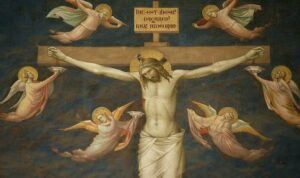
Here followes an essay on holiness and the wisdom of pursuing it. Taken from The Articles and Manuscripts of Dominic Farrell. Originally simply titled, ‘Christian Wisdom,’ this rather uncompromising document admonishes the soul to go forward in the way of Christian perfection, and explains the nature and excellence of this high estate. There is a marked fondness in the writer for St. Paul and The Imitation of Christ by Thomas à Kempis throughout the essay.
I
The Divine Invitation

Perfection means moral uprightness, love of virtue, possessing by habit and disposition the moral qualities that are God’s. As Christ is the human embodiment of all that is good in the Father, so the perfect Christian reflects and embodies in a human way, all that is in Christ, the Word made Flesh. To be how God wants you to be is the aim of the Christian life. Only in and through Christ can we hope for some measure of perfection as our heavenly Father is perfect. But it is not easy to be how God wants us to be. We are always very far from this before so high and holy a God, before Whom not even the stars are pure. Now each soul is a very unique expression of God Who can be expressed through creatures in an infinite number of ways. God has loved you personally from all eternity. ‘I have loved thee with an everlasting love.’ (Jer 31:3) But He thought of you in Christ; that is in the one eternal and perfect expression of Himself. He has loved you because He loves His Son in Whom all His glory and delight rest. The closest ones to His Son by a uniting resemblance are the most perfect and the most beloved. Perfection then, requires likeness to Christ Who is the way to the Father. Through our Brother in the flesh, we can become real sons, real children and heirs of the Heavenly Father. By this we come to share in God’s own eternal happiness. According as we resemble our Model, Jesus Christ, to such will correspond our glory and blessedness in the beatific life.
The way of high perfection or of the religious life is not a command or a calling that must be followed under pain of sin. ‘If thou wilt’ and not ‘thou shalt’ is what is said by Christ to those brave and faithful souls who would do more than the ordinary for God. Our Lord merely points out that it is wise by the divine reckoning to go up higher by virginity in body and soul in order to reach something of perfection. ‘He that can take, let him take it’ He says. (Matt. 19:12). He wants everyone to thrust out for the better things, to have an honest go at becoming perfect.
He spoke to all when He said plainly and simply ‘be ye therefore perfect as also your heavenly Father is perfect.’ (Matt. 5:48). That is, if you want to know how good you should be, think of the goodness of God, and do all you can to reproduce this in yourself. The one who hungers and thirsts after justice, need only put two and two together and set out on the highway of perfection, of religious life, or of deeper spirituality in order to have the best chance of laying hold on real sanctity.
God is going to reward the just for all eternity in Paradise and punish the wicked in hell. So the way of perfection ordinarily starts with a reverential fear of the hidden judgements and the terrible justice of God.
Are you really going to risk leading a soft and careless life when such an awful Judge waits to pass sentence on you as soon as you pass through the doors of death? Christ will judge you and decide whether you are worthy of salvation or condemnation. ‘In all things look to thine end,’ says the Imitation ‘and how thou shalt be able to stand before a strict Judge, to Whom nothing is hidden, Who takes no bribes, nor receives excuses, but will judge that which is just. O most wretched and foolish sinner! Why dost thou not provide for thyself now against the day of judgment, when no man can be excused or defended by another, but each one will have enough to do to answer for himself?’ How often has not the sobering thought of death and the serious things that follow it, been the cause of persons abandoning the world in order to serve God with all their energy and with fear and trembling, to work out their salvation?!
Ah! That last day will come for each one of us, a day when even holy souls will lament that they are still not what they should be before God while agonizing on their deathbed. And what will your thoughts be in that hour? Truly, we ought not to labour during this fleeting earthly life, for the bread that perishes, but should seek only after the bread that perishes not, after that which may sanctify and preserve our soul unto life everlasting.
It is wise to seek God now while time is on our side and we are not bedridden with some illness. And even if we are, it is foolish to hope for the goods of time when we are fast nearing eternity. To labour for the bread that perishes not, is to desire and put into effect now, the means to acquire perfection.
To follow the divine invitation to perfection is to put away the present things as much as possible and to reach out to the things that are spiritual. It is to ‘count all things as dung,’ as the Apostle says, that we may ‘gain Christ.’ (Phil. 3:8). Thomas á Kempis speaks further saying, ‘think of nothing but thy salvation; care for nothing but the things of God. Whilst thou hast time, heap to thyself riches that will never die.’ To strive after perfection is to put your heart into all that concerns the service of God. It is to use all your energy in putting off the old man according to sin and putting on the new man according to grace.
Nature tends towards sin, towards things below and interests herself in the outward things of a man. But grace minds those things that are serviceable to the spirit and wages war against the effects of sin that have left their mark in the soul and in the flesh.
The things of grace are infinitely superior to the things of nature and so to hate and lose our lives in this world as Our Lord says, is true wisdom because if the man according to nature does not suffer and die in us, we cannot lay hold on the treasures and riches of grace which can alone make us happy and will last forever. Whatsoever is of this present world, must pass away with it in the end. But what is according to the spirit will follow us into eternity. God advises you to be wise by despising the world which has a mind only for what is temporal and is ignorant of those other things that are so much the more precious and valuable because they are according to grace and not according to nature.
To strive for the lower things, the goods of nature is to follow the world. These will serve you well in the eyes of men, but not so in the eyes of God. Man looks on all things with a carnal eye, but God sees into the heart. If you live by the fear of man, you will strive for the goods of nature, that you may be approved and admired by creatures. But if the fear of God is in you, you will learn to disregard the thoughts of men, and consider how best to please God by withdrawing from sensual and visible things and turning yourself to those that are spiritual and invisible. That which makes a man happy and just is not the owning and multiplying of exterior things, but rather in the casting off and contempt of these things and in the interior peace and joy of a good conscience.
II
Wise According to God

St. Paul tells us that ‘the wisdom of this world is foolishness with God.’ (1 Cor 3:19) The wisdom of the world consists in setting great value on temporal and visible things which must all perish with the passing away of the world. The wisdom of the world craves for and relishes the things of time, but Godly wisdom is the contempt of earthly things and the desire and relish of those that are heavenly and eternal. (This contempt is only real insofar as these things incline us in a direction opposite to union with God). That which helps not in the securing of a blessed eternity is of no profit to you. The man of the world spends time, effort and pain to secure earthly advantages. His eyes are fleshly alone, for he does not use those of his soul. His sight extends only to temporal things and does not penetrate into the depths of eternity. His labour and activity is directed towards a prosperous and happy earthly life, but he thinks little or nothing about the life to come. His treasure is earthly and so he thinks, loves and speaks only of what is earthly. He clings to the present life, shudders at the thought of death and does all he can to procure fleshly and temporal conveniences. His interests are to gain temporal riches, vain honours and many base and short-lived pleasures.
All his energy, attention and skill are employed in the pursuit of these ends. For ‘all that is in the world’ as the Apostle says, ‘is the concupiscence of the eyes, the concupiscence of the flesh and the pride of life.’ (1 John 2:16) But this is all foolishness with God, Who sets no value on that which must pass away with time. ‘The flesh profits nothing’ says Our Lord, ‘but the spirit gives life.’ (John 6:63)
To seek perfection then, is to set aside the things that are below and to seek the things that are above. It is to forsake the carnal life in order to find and relish the spiritual life. Only that which endures forever is worth the aspirations of a Christian. That which is short-lived and that comes to an end with the present life is vanity and is the portion of the dead and the blind. ‘Vanity of vanities and all is vanity.’ (Ecc 1:2) For they who disregard the better things that are spiritual are as those who are without life and who cannot see. For so said Our Lord to His disciples, ‘let the dead bury their dead.’ (Luke 9:60) For he who lives not by the spirit is considered dead in the sight of God.
Now as that which is of great value is not purchased without great price, so to become holy is to do violence to your own lower nature in order to subdue it and make way for the triumph of grace. For ‘All run in the race’ says St. Paul, ‘but one receives the crown. So run that you may obtain.’ (1 Cor 9:24) Not to fight against the enemies of your salvation that dwell both within and without, is to lay down your arms and surrender to them. But to fight and give them battle is to have an assured hope of the divine assistance and of final victory. ‘The kingdom of heaven suffereth violence, and the violent bear it away.’ (Matt 11:12) So fight that you may win and know that the fight against the passions, the world and the demon is indeed the good fight and the only one worth engaging in.
One strives for holiness in order to detach himself from the earth and attach himself to God. ‘Who will give me wings like a dove, and I will fly and be at rest?’ (Ps 55:7) says the Psalmist. And what are these wings but the holy liberty of the children of God acquired through purity of heart. Once the affections are detached and liberated from the passions and the love of all the vanities of the world, the soul flies to God as a bird on the wing. To throw off all slavery to sin and to all affection for that which is sinful is to unchain oneself form bondage and give wings to the spirit. To desire virtue and holiness then, is to wish to set oneself free in order to relish things divine and to attain union with the object of the soul’s desire.
It is the noble desire for sanctity that will enable you to overcome whatever appears to be an obstacle in your way. That which seems to deter you from giving your life to God, will seem to be of little consequence if you are determined from the heart to sanctify yourself and become like the Saints. Happy is he who sets his heart on what is spiritual and lays aside all that is carnal. For true wisdom, as we have observed, is not found in the things that are of the earth, but consists in contempt for whatever passes away and the love and relish for the things do not pass away. The virtues are the rungs of the ladder that lead us up to those immortal goods that are of the spiritual world. He who diligently strives for virtue is a true seeker of holiness and his desire is not in vain.
Set aside the ambition of gaining the applause of the world, for whatever you gain in the world, all must end at death and vanish like a puff of smoke. Attend not to idle talk but to prayer, not to self-indulgence but to mortification, not to the quest for ease and comfort, but to labour and the practise of ready obedience, not to idle tales and vain news, but to watchfulness and devout reading, not to rising above others, but to lowering yourself and being subject to all, not to the serving of sensuality, but to the exercise of virtue, not in fine, to the following of this present world, but to the aspiring after and following of Our Lord Jesus Christ. Never forget; that which is of the world, no matter how pleasing to the senses, must sooner or later come to an end, but that which is of God will last forever.
Think often about what you would wish to have done with your life at the time of your death. See yourself already in that last struggle upon your deathbed. Reflect that you will die, that your body will slowly decompose and become the food of worms. Of these things the Prophet thought on when he spoke thus; ‘I have said to rottenness: Thou art my father; to worms, my mother and my sister.’ (Job 17:14)
And thinking of the immensity of eternity and the consequences of what we do in the present life, David said ‘I thought upon the days of old: and I had in my mind the eternal years. And I was exercised and swept my spirit.’ (Ps 76:6-7) He considered the world to come and with fear and trembling began to prepare his soul for the great day of eternity. You ought also to do the same by setting your heart on holiness.
III
The Time of Merit

This life is not to be squandered away on trifles and the pleasing of our own will. It is given only that we may labour at our salvation and become holy. Once the present life is over, the time of meriting is at an end. Are you suffering? Are you fighting a hard battle? Then the time of great merit has come for you. It is better to use our sufferings now for our spiritual profit, than to risk the endless torments of Hell or the terrible fires of Purgatory. Give yourself now to penance and to fervour, in order that you may be spared as much as possible from the rigours of Divine Justice. If you could see Hell or spend but a minute in Purgatory, you would be ashamed to complain of any of the sufferings of this present life. And if you could glimpse something of Heaven, you would say with St. Paul, ‘the sufferings of this life are not worthy to be compared with the glory to come that shall be revealed in us.’ (Rom 8:18)
Set your heart then, on things to come and let your hope rest in these rather than in not feeling trouble and adversity. A whole day spent in the midst of noise, distraction, petty pleasures and the hearing of gossip and random news is far less rewarding than a quarter of an hour spent on your knees, recollected in God’s presence, or ten precious minutes of spiritual reading.
Why do you care so much about the body while the soul is left empty? Feed the soul more and the body will not make such a commotion. Because you too easily ignore the hunger and thirst of the soul, your body is frequently restless, grumpy and full of complaints. The answer is not to keep pampering, flattering and giving more to the body, but to mortify it for the sake of the soul. Allow the soul to breathe by means of keeping still, calm and recollected when you pray. This will help you a thousand times better than all that vain attention given to the senses.
You are going forward to spiritual things, having seen the vanity of the world and the flesh. Surround yourself then with devout and spiritual books. Keep feeding the mind on the things that matter to the soul and cut off that craving to waste time in prolonged and useless chatter, in idling about, in endless reading of the newspapers and such like. Happy is the Christian who knows how to dispose well of himself whether he be at work or at home with time to himself.
It is wisdom to set your life in order now in view of the life to come. It is good not to put off till tomorrow that which may be achieved today. For ‘blessed is that servant whom when his Lord cometh, he shall find watching.’ (Matt 4:46) But accursed are the slothful and the negligent, ‘for at what hour you think not the Son of man will come.’ (Luke 12:40)
The wisest thing you can do is prepare yourself for suffering and strive ever to dispose yourself better for it. If only you are resigned to suffer and to labour, there is nothing more to be afraid of in this miserable world. It won’t help you to always be on the run from all present and future crosses. You will always carry restlessness about with you. But if you stand ready and willing to endure hardship, you will have stable peace of soul and nothing can break or harm you.
We often confuse the things we suffer as evils to be avoided. But the evil is in us and God aims at uprooting it and correcting us every time He lets some temptation, harsh word or humiliation to befall us. Don’t turn your indignation on the circumstance, the person or the pain that makes you suffer. Instead, strive to direct all anger against yourself. This is something of real holiness (though perfect meekness is patient and void of anger even in regard to self). But man in general will blame anything but himself. He is forever excusing himself, defending himself and logging complaints against others.
So you can begin to see, the wise man is one who learns to undo himself and to look at things in the opposite way that the world does. The greatest among men are those blessed and wise few who have learned how to rule the spirit that is in them. But be not disheartened; the good news for you is that you don’t need great strength to be as these were. You need wisdom. The strong man has confidence in his own strength, but the wise man, knowing his great weakness, has recourse to God and this is the source of his strength. You need the convictions that the Saints had, and you are half way there already.
The Saints were thoroughly convinced that they could do nothing better with their lives than to constantly strive after perfection and do good to their neighbour. They saw it as folly to use their time as though there were no eternity to prepare for. They knew that merit could be acquired or lost at every moment.
Their conversation was carful, humble and full of charity. They avoided idle words, unbecoming jests and anything that might offend God or their neighbour. They knew it wasn’t a good thing or of any use to get angry and complain at the treatment given to them by others. In speaking or listening, they were aware that ‘the tongue is a world of iniquity.’ (James 3:6) They knew that there was a time to keep silence and a time to speak. In food and drink they were careful, moderate and often reluctant to attend to the needs of the body. They never ate in order to indulge the flesh, but only to sustain sufficient health for the service of God. Through the love they had for prayer and by reason of their fervour of spirit, they often preferred rather to fast than to eat. Work did not hinder them because they made use of it to practise mortification and to guard against such things as sloth, idleness, melancholy and temptation.
When crosses came their way, they immediately looked to the greater sanctification of the soul that could be gained through patience and resignation. Since the soul was all they cared about, crosses pleased rather than displeased them. They knew well that it was good to suffer now in humble patience than to arrive at the judgment devoid of merit and having pleased themselves rather than God.
Often the cross displeases us only because we want our own way. But our way is not God’s way and he who always aims at getting his own way, will in the end be filled with fear when he must stand before his Judge Who is sure to punish him severely for being so stiff necked. God is not mocked and will not bend His will to fit our whims, no matter how just and blameless we make ourselves out to be. It is we who must constantly bend to the will of God, recognizing that He is in control and that our part is to submit to Him.
There is no real patience in one who is ready to suffer only as much as he pleases. We have to learn to endure what we don’t want to endure and to do so in order to please God and precisely because it is displeasing to us. If we can do this, we will end up always agreeing with what God does with us and will have the wisdom to see that what He does is always a thousand times better than what we might decide to do through our own imagined lights and whims.
So, perfection means union of our will with the will of God. And this process of making our will the same as God’s will is something that comes about chiefly in the time of pain, trial and various sufferings of body and soul. Our truest good and happiness lies in our conformity to the divine will. It does not lie in being free from sufferings and in being able to do our own will and indulge sensuality. This is the folly of those who live to the world.
For those who live to God, it is not so important whether or not things go well for them on a temporal level. The most important thing for them is whether or not they are conformed and united to God’s will. It is better to suffer death in order to fit in with God’s will than to rule a nation by our own will. In the end, our merit or demerit comes down to how well or ill we have done God’s will while on earth. Are we able to say with Our Lord and with utmost desire, Thy will be done on earth as it is in Heaven?’ (Matt 6:10)
Do we want God’s will done in ourselves, in our lives, just as it is done in the lives of the blessed in heaven? If we do not desire this from the heart, then we must still be counted among the infinite number of fools. But if it is our desire, we have arrived at Christian wisdom and whatsoever befalls us will not be able to make us sad.
